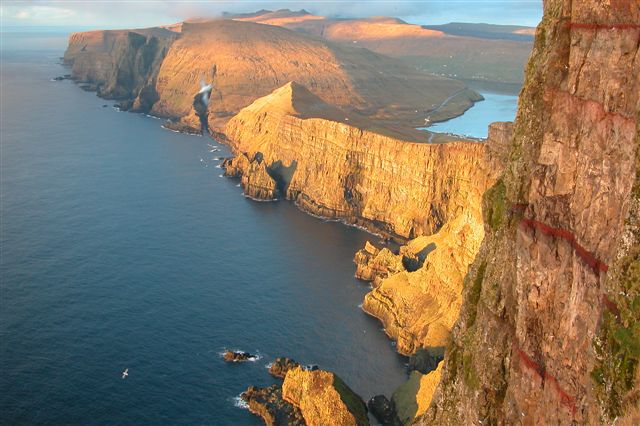
Every summer, a number of pilot whales was hunted on the island of Vágar in the northwest of the Faroe Islands archipelago.
Every summer, a number of animal activist associations, as Sea Sheperd, strongly oppose the hunt by attempting to stop local boats and documenting the annual pilot whale cull. By admission of Sea Sheperd itself, "The long-finned pilot whale is listed in Appendix II of Convention on Migratory Species (CMS), and also on Appendix II of the Convention on International Trade in Endangered Species of Wild Fauna and Flora (CITES), meaning that the species is not necessarily threatened with extinction" , but Sea Sheperd adds "it may become so unless hunting is closely controlled." In addition there are also some legal issues, acconrdingly with the organization: "It is the position of Sea Shepherd that Denmark fails to fulfill its obligations under the Berne Convention for a number of reasons:
The Faroe Islanders, who are Danish nationals, deliberately kill protected species that are listed under Appendix II of the Berne Convention, to which Denmark is a signatory state.
While the Faroe Islanders claim that that the grind is not a commercial hunt, grind meat is sold in supermarkets, hotels and restaurants, contributing to a trade that is even marketed to other European visitors to the Islands.
The long-finned pilot whale passes through Faroes waters on an annual migration route to feed in Arctic waters. A single grind can completely decimate, and sometimes completely eradicate, an entire pod. This slaughter occurs in, and around, Danish territorial lands.
Unfortunately, issues of a foremost importance for local population within the Arctic area, as hunting, are often misunderstood and blamed from the outside. Contrary to the common belief, this annual event taking place in Faroes, although traditional, is not a festival nor a ritual. Indeed, pilot whales are taken any time of the year (but the majority between July and September), to provide food for the local population: the catches are not commercialized abroad, although whale meat and blubber are occasionally available in the local supermarkets or local restaurants, and they are rather shared for free among the participants and local community.
Whaling in Faroes is strictly regulated. Actually, records exist that Pilot whale hunting has been regulated since the XIII-XIV century: the Sheep Letter, a Faroese law from 1298 outlines rules for the use of whales. Later, a dedicated regulation for pilot whaling was enacted in 1832 and was most recently updated in 2013.
The "IUCN Red List of Threatened Species" reports in regards of the long-finned pilots whale and hunting: "The only current fishery for long-finned pilot whales is undertaken in the Faroe Islands and Greenland. Although this fishery has been actively pursued since the 9th century, catch levels have apparently not caused stock depletion, such as occurred off Newfoundland. Catch statistics exist from the Faroes since 1584, unbroken from 1709 to today, showing an annual average catch of 850 pilot whales (range: 0 - 4,480) with a cyclic variation according to the North-Atlantic climatic variations (Bloch and Larstein 1995). The IWC, ICES and NAMMCO have concluded, that with an estimated subpopulation size of 778 000 (CV=0.295) in the eastern North Atlantic and approximately 100 000 around the Faroes (Buckland et al. 1993; NAMMCO 1997) the Faroese catch is probably sustainable. In Greenland, catches are relatively small."
Few days ago five activists from Sea Sheperd have been convicted (they were arrested on July 23) as they attempted to stop and document the annual pilot whale cull.
While Sea Shepherd is going to immediately appeal the verdict and the sentences, the Government of the Faroe Islands has released the following document:
"Law and order must be maintained":
In relation to the conviction of animal rights activists by the court on August 7, the Government of the Faroe Islands has the following statement:
"The Government of the Faroe Islands values the right to protest, which is a fundamental part of any democracy. But law and order must be maintained and violation of our laws will be dealt with by the police and the legal system.
The intention of the Faroese whaling law (Grindalógin) is to ensure that the utilisation of pilot whales for food can be carried out according to the regulations. Obstructing a whale drive can be dangerous and can put people and property at risk.
The utilisation of pilot whales for food is a legal activity in the Faroe Islands. And just as freedom of expression and the right to peaceful protest are legal rights, so is the right of the Faroese people to make good use of their natural resources, including pilot whales.
Whaling in the Faroe Islands is conducted in accordance with international law and globally recognized principles of sustainable development. Catches are sustainable and fully regulated, with emphasis on animal welfare. It is a natural part of Faroese life and pilot whale meat and blubber remains a cherished supplement to households across the islands."
Sources: Sea Shepherd, Government of the Faroe Islands, "The Local" (DK)